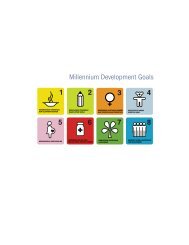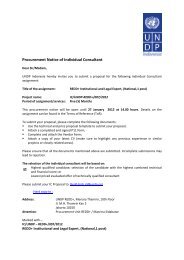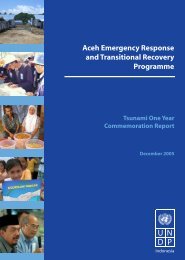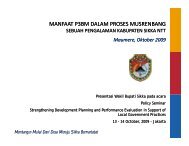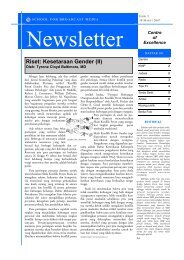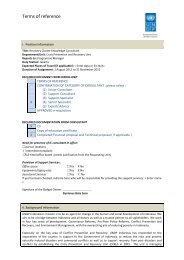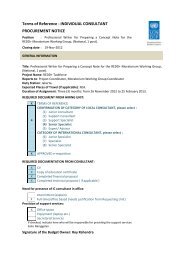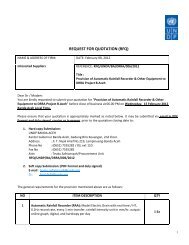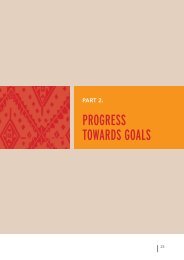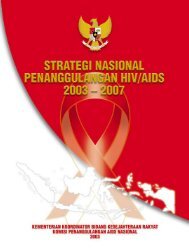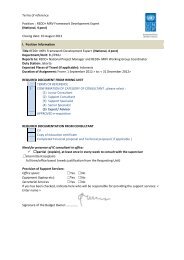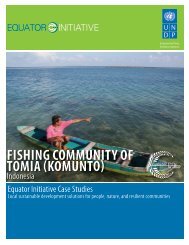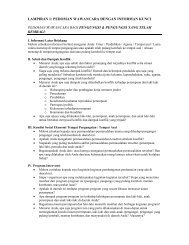Indonesia Human Development Report 2001 - UNDP
Indonesia Human Development Report 2001 - UNDP
Indonesia Human Development Report 2001 - UNDP
You also want an ePaper? Increase the reach of your titles
YUMPU automatically turns print PDFs into web optimized ePapers that Google loves.
Foreword<br />
This is the first National <strong>Human</strong> <strong>Development</strong> <strong>Report</strong> for <strong>Indonesia</strong>. It has been preceded by<br />
National <strong>Human</strong> <strong>Development</strong> Index <strong>Report</strong>s in 1996, 1997 and 1999. As before, this has been a<br />
collaborative effort between the National <strong>Development</strong> Planning Agency (BAPPENAS), Statistics<br />
<strong>Indonesia</strong> (BPS) and the United Nations <strong>Development</strong> Programme (<strong>UNDP</strong>).<br />
The National <strong>Human</strong> <strong>Development</strong> <strong>Report</strong> is being published at an important juncture in <strong>Indonesia</strong>'s<br />
history, when the country is consolidating its nascent democracy while simultaneously striving to<br />
overcome the economic and financial crisis that overtook much of East Asia in 1997. The timing of<br />
this <strong>Report</strong> has dictated its concerns and contents. The primary focus is on the interrelationships<br />
between human development, democracy and economic progress in <strong>Indonesia</strong>. This <strong>Report</strong> is an<br />
ambitious and innovative undertaking compared to many other national human development reports,<br />
which focus on a single theme.<br />
This <strong>Report</strong> poses a question that is very much on the agenda of policy-makers in <strong>Indonesia</strong>: How<br />
can <strong>Indonesia</strong> achieve steady progress in all indicators of human development as it restructures its<br />
economy, refashions its governance institutions, and devolves decision-making to regions and localities?<br />
The answer, this <strong>Report</strong> argues, lies in building a new social consensus for <strong>Indonesia</strong> - a consensus<br />
that renews a shared commitment to human development, establishing that all <strong>Indonesia</strong>ns - as citizens<br />
of <strong>Indonesia</strong> - are entitled to nationally mandated standards of human development. Despite the odds<br />
confronting <strong>Indonesia</strong>, which this <strong>Report</strong> spells out in some detail, it is optimistic that current challenges<br />
can be surmounted.<br />
The <strong>Report</strong> is enriched by a wealth of new statistical tables. These include the <strong>Human</strong> <strong>Development</strong><br />
Index, along with its complementary measures: the <strong>Human</strong> Poverty Index, the Gender-related<br />
<strong>Development</strong> Index, and the Gender Empowerment Measure. These data are now available not just at<br />
the national but also at the provincial and district levels, allowing key human development issues and<br />
priorities to be publicized and debated throughout the country.<br />
These detailed statistics will be invaluable as <strong>Indonesia</strong> decentralizes much of the responsibility for<br />
development planning and policy to hundreds of individual districts. As with all such composite<br />
measures, however, the various human development indices need to be applied with care. Although<br />
they offer broad signposts toward human development needs and priorities, they must also be<br />
supplemented with all other quantitative and qualitative information that local authorities should have<br />
at their disposal.<br />
iii



